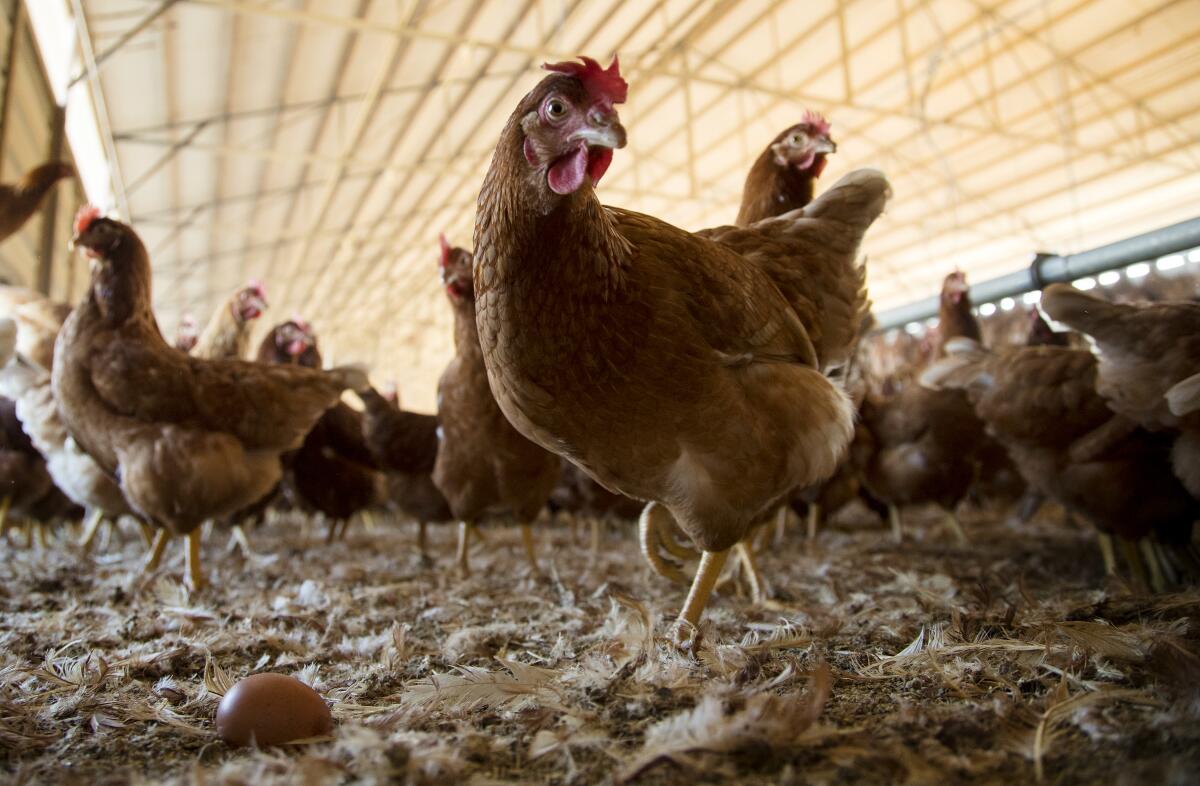Bird flu concerns grow in California as deadly virus infects more farms

- Share via
Federal and state officials have confirmed outbreaks in the last few weeks of a fast-spreading avian influenza strain — commonly known as bird flu — in four new California counties, sparking concerns about the possible agricultural and financial blow of the virus.
The “highly pathogenic” bird flu was confirmed Wednesday at two commercial farms in Stanislaus County, joining recent outbreaks at poultry farms in Fresno, San Benito and Sonoma counties, according to updates from the California Department of Food and Agriculture. The strain is easily spread among birds and often fatal for them.
“It is important to note that [the bird flu] is widespread in California and may also be present in other counties that are not listed,” the agency said in a statement Wednesday. “Enhanced biosecurity is critical in the face of ongoing disease outbreaks.”
Surging egg prices earlier this year were blamed on an outbreak of the bird flu that killed millions of hens and left grocers struggling to keep shelves stocked.
California agriculture officials said that in order to protect other flocks from the disease, the farms where outbreaks were reported are being quarantined and their birds euthanized.
After cases were confirmed earlier this week at two Sonoma County poultry farms, officials there declared a state of emergency, calling the outbreak a local disaster.
“We need to promote and protect our local food shed and the agricultural producers who dedicate their livelihoods to producing food for our local populations and beyond,” Sonoma County Agricultural Commissioner Andrew Smith said in a statement. “These producers are integral in maintaining and increasing food security in our communities.”
Federal wildlife officials have confirmed that an outbreak of avian influenza has killed 21 condors in Arizona and Utah since early March.
Sonoma County Supervisor David Rabbitt said he is concerned about economic and supply-chain issues that could result from the emergency, noting that south Sonoma County has about “one million farm birds within a five-mile radius” of one of the facilities hit by the outbreak, and that they provide as many as hundreds of thousands of eggs daily.
Rabbitt also said that more than 200 employees work at the two affected Sonoma County facilities, and will be hurt by the losses.
In October, as cases of avian flu increased nationally and the first California outbreak of the season was detected in Merced County, the state veterinarian urged that California bird farmers move their flocks indoors for now.
The Merced County outbreak was confirmed at a commercial turkey farm, home to about 30,000 birds, according to USDA data tracking the virus’ spread.
The most recent outbreaks confirmed in Stanislaus County were at two commercial farms that are raising about 250,000 chickens each. The infected Sonoma County farms were a duck farm with 169,000 birds, and a commercial egg producer with more than 80,000 birds.
The San Benito and Fresno county cases also included commercial duck farms, with 5,000 birds in San Benito and 23,000 in Fresno, according to the USDA data.
State officials did not disclose the names of the companies involved, and USDA data was limited.
Avian infuenza can be found in both wild and domesticated fowl, including chickens, turkeys, pheasants, quail, ducks and geese, and its typically spread through bird-to-bird contact, according to the state Department of Food and Agriculture.
There have also been confirmed cases in wild birds over the last month in Sacramento and Santa Clara counties, according to the USDA.
Officials noted this spring that continued spread of the virus could soon become a concern for the still-endangered California condor.
According to the federal Centers for Disease Control and Protection, this bird flu strain is considered a low risk to humans. However, the World Health Organization has said there is some cause for worry due to some reports of the virus infecting humans.
Californians can report unusual sick or dead pets or domesticated birds via the state Department of Food and Agriculture Sick Bird Hotline at (866) 922-2473. Any unusual or dead wild birds should be reported to the state Department of Fish and Wildlife online.
More to Read
Sign up for Essential California
The most important California stories and recommendations in your inbox every morning.
You may occasionally receive promotional content from the Los Angeles Times.












